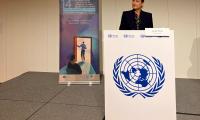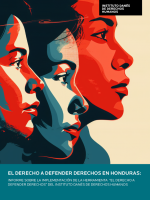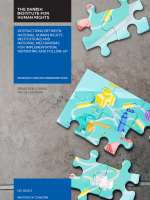As the world stands today, it is more important than ever to prevent and document torture and war crimes

Director of Danish Institute for Human Rights talking at the opening of the 14th international GANHRI-conference
Today director of Danish Institute for Human Rights Louise Holck opened the 14th International GANHRI-conference in Copenhagen that we at the Danish Institute for Human Rights are co-hosting with the Ukraine Parliament Commissioner for Human Rights, the GANHRI (Global Alliance Of National Human Rights Institutions) Secretariat, and the UN Office of the High Commissioner for Human Rights.
On the occasion of the conference Louise Holck and international director Mette Thygesen have written the following op-ed in Danish daily Jyllands-Posten.
Recently, a story surfaced about a soldier who had entered a 75-year-old woman's home and ordered her to undress. When the woman refused, the soldier brutally attacked her, causing her to lose several teeth and break several ribs. He then forcibly removed her clothing, strangled her, and raped her.
This incident took place in Ukraine, and the perpetrator was Russian. It is documented in a new and comprehensive report by the UN’s Independent Commission of Inquiry on Ukraine. However, such incidents could occur in many places in the world today. While bombs are falling in Ukraine and Gaza, statistic from the UN reveal that we are seeing a higher number of armed conflicts than at any other time since World War II. From Gaza to Gabon, Ukraine to Yemen, Myanmar to Mali, Armenia to Afghanistan we see how armed conflicts, coups, and authoritarian tendencies are resulting in torture, degrading treatment of civilians, and other gross human rights abuses and war crimes.
It is essential that we do everything in our power to prevent and address such abuses. That is why the Danish Institute for Human Rights works diligently with states, partners, and legal systems worldwide to create frameworks that prevent torture and other war crimes. And when abuses still occur, stronger documentation is needed. It is the only way to determine whether the rules of war and human rights are being upheld. Documentation is crucial for the legal accountability that inevitably follows when wars and conflicts come to an end.
The sad state of the world coincides with the 75th anniversary of the UN's Universal Declaration of Human Rights, adopted by world leaders in 1948 in the aftermath of a world war no one wanted to repeat. It states that the kind of torture and degrading treatment suffered by the 75 year old Ukrainian woman, for example, is illegal. Since then, international conventions, laws, and agreements have cemented an absolute and non-negotiable ban on torture.
So, in many ways, we stand at a crossroads where the violations that the declaration and subsequent conventions were meant to prevent are occurring worldwide. In this context, we are bringing together National Human Rights Institutions and experts from around the world in the UN City in Copenhagen to find new solutions to prevent and combat torture at the 14th international GANHRI-conference.
In many countries, a central part of the work of national human rights institutions is to prevent torture by influencing legislation, training security forces to understand their responsibilities, and visiting prisons where torture can easily occur in secret. In cases where torture still occurs, we and other human rights institutions can play a crucial role in documenting the violations. But it requires resources and political will to ensure awareness of the rules of war and human rights obligations, access to complaints and follow-up, and independent collection of evidence. This task is further complicated in a media landscape challenged by misinformation and intense polarization.
No matter which war or conflict we are discussing, a strengthened systematic prevention and documentation is the only way to ensure justice and accountability for those responsible in the long run. Therefore, strong independent bodies such as national human rights institutions are needed, representing not the parties to the conflict but the civilians caught on each side of it. Because it is the civilians and their rights that we must protect.





